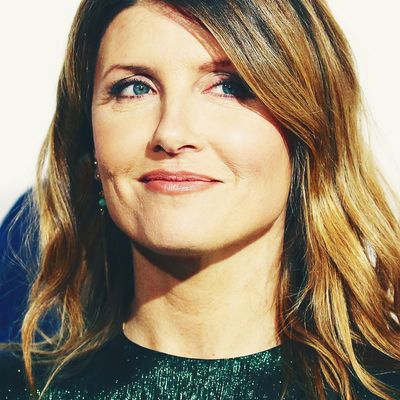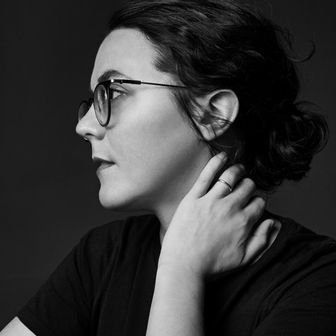
For the first few seconds of my phone conversation with Sharon Horgan, all you could hear was my dog barking. “I’m so sorry,” I mumbled to the writer-producer-actress multi-hyphenate. “I’m working from home.” Before she could respond, I started babbling about how much I love Catastrophe, how I’d watched every episode available when I was in labor a few years ago, how excited I’d been to see her newest show, Motherland. “Great,” Horgan replied once I finally shut up, gracious if wary, “ … thank you.”
Flustered and red-faced, I may as well have been a Sharon Horgan character — someone whose domestic life intrudes on the public person she wants to be. As in Catastrophe, the show she created, writes, and stars in with Rob Delaney, and the HBO show Divorce, Horgan’s newest show depicts the comedy and pain of contemporary family life. Anna Maxwell Martin stars as Julia, a mother with two kids her own mother is no longer game to watch during the workday. Suddenly in need of new people to rely on, Julia befriends Liz (Diane Morgan), a wry single mother, and Kevin (Paul Ready), a stay-at-home dad fascinated with the popular-mean mother group, headed by the villainous Amanda (Lucy Punch). But according to Horgan, this is a show that’s not actually about motherhood.
We chatted about that, lying to caregivers and children, and whether motherhood takes a toll on creativity.
Much of your previous work has characters who are parents, but this is the first show where you’ve focused specifically on motherhood. Why did you want to concentrate on motherhood now?
I know Motherland seems like it’s about motherhood, but really it’s more about the allegiances and friendships you encounter once you become a mother. I mean, obviously, children are a part of it, but only as far as they impact the characters’ lives. It’s not really motherhood, per se, because you don’t see a huge amount of mothering. It’s more about how to get through the day, how to survive and rely on each other. It’s just trying to capture that, really.
You’ve spoken about writing from your own life — I’m curious, does Motherland portray some of your own experiences with mom friends? Is there a mean mom, an Amanda, in your life?
An Amanda, ha! I mean, not really. I have approximations of Amandas. If you blended a few of the mothers I’ve known together, you might form an Amanda, but no, not specifically. But yes, I’ve known that kind of a person — the kind of person who looks put-together on the outside and seems like they’re perfectly in control and has a Queen Bee vibe, but once you look deeper, you see they’re just as much a mess as everyone else.
Have you experienced the more positive side of mom camaraderie?
Two of my closest friends are mothers I met when my eldest girl started school. She’s 14 now, and those women are still my good pals. The character of Liz is kind of based on one of them, a single mother. Definitely, I got lucky — I found my tribe, a small group of mums who were great fun and supportive. And along the way, I met a lot of other ones.
Motherland is definitely not meant to be an attack on mom friends, though. It’s a comedy, so the characters are heightened and exaggerated versions of the moms I met — and dads. Dad. There would always be one dad in there.
The characters on Motherland become friends organically, but have you ever participated in a more formal group for moms — in real life or online?
A moms’ group online, no. No. I never did Mumsnet, or that thing where you meet mums when you’re pregnant — I don’t even know what the name for that is. I sort of isolated myself at first, probably wrongly. But I survived. I did it my way.
I read that you once lied to a nanny while breaking up with her. That was relatable to me — I told my son’s former day-care provider we’d be pulling him because I got fired.
Yes, it’s really hard! She was not a good nanny, and I found out too late. I took the chicken’s way out and used the ol’ “I’m moving to America.”
I find myself lying to my toddler lately, too, to make things easier. “You can’t watch TV because the computer is asleep.”
Yeah! You lie about what time it is. Yes, lie to your children! My 9-year-old’s looking at me now with horror in her eyes, but you’ve gotta do what you’ve gotta do! Obviously, if you don’t have to lie, don’t.
I think that’s why I love the character of Liz so much — she has all these shortcuts. She’s found a way to do it that works for her. She has all this wisdom to impart. We could all use a little of that, I think. A bit of letting ourselves off the hook and taking the easy way out sometimes. Why make a cake from scratch if you don’t have to? Why? Why do anything unnecessary for a birthday party? You’ve been working really hard all week. Cakes don’t need to be made from scratch. They don’t. That’s my advice, anyway.
Is that advice you would have wanted to be given, when you were a new mom?
It was definitely something I had to learn. Every first-time mother does. Back then, it’s all freshly cooked food, chopped fruit, no sugar. Then you realize you need to cut yourself a bit of slack. We have to stop setting impossible standards that mean we spend even less time with our kids.
Sheila Heti’s new book, Motherhood, is about trying to decide whether to have a baby. The narrator worries that motherhood will affect her ability to be creative. Do you think motherhood’s had an effect on your creativity?
After every kid I had, there was a period of time where my brain went to mush. But that happens to everyone. It affects me practically, more than anything. Creatively, I think I found myself entirely, after I had kids. Part of it is because this whole new world is open to you. But the other part is that when you have kids, you want to do what you did before and you also want to be a mom, so you’re just very selective with your time.
For me, at least, it’s been a good thing, creatively.
Motherhood is a big theme in a lot of pop culture right now — Motherland, the Australian show The Letdown on Netflix, The Perfect Nanny —
The perfect what?
The Perfect Nanny, the French book?
Can you spell that?
N-a-n-n-y.
Do I have the perfect nanny, is that your question?
No, I was just bringing up a book by that name. Have you read it?
Oh! No, is it good? Is it a fiction or a how-to manual?
It’s a novel about a nanny who murders the children.
Oh my god! I cannot read that. I cannot read that.
It’s dark! But it’s one of a number of books, TV shows, and movies with motherhood as a topic. Do you think there’s a preoccupation with motherhood right now?
I don’t know. I think it’s more that there are more female writer and showrunners, and those writers and showrunners are mothers. I think it’s more likely there’s more shows with that as a concept because, thank goodness, our airwaves are more populated by female-driven stories. And they’re more real now because they’re actually made by women — not what a man’s dreamed up with his imagination. It’s the actual truth.





